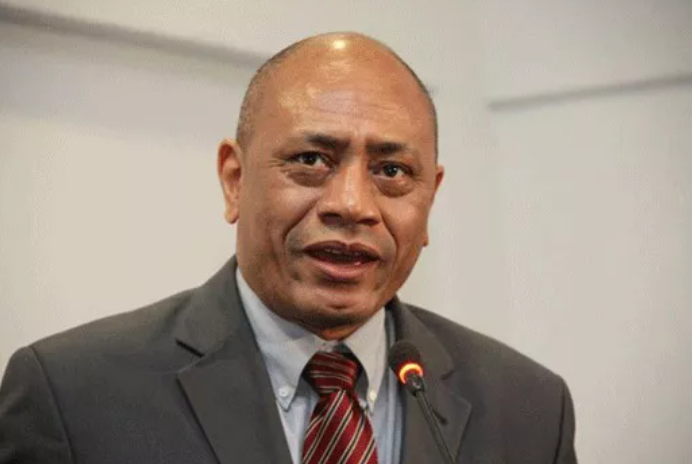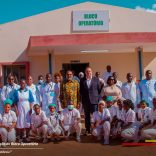Mozambique: Misinformation fuels crimes against persons with albinism - Minister
Covid-19: Pandemic can help end political neglect of health by African governments, Mozambican academic says

Photo: Lusa
The Covid-19 pandemic could lead African governments to a greater focus by on health systems, which have been neglected by elites who turn to rich countries for medical care, Mozambican academic Lourenço do Rosário said on Tuesday.
“Confinement is teaching this lesson, and when this is over, nothing will be the same” about the way African governments manage health systems, argues Lourenço do Rosário, founder and first rector of A Politécnica, the first private university in Mozambique.
The fact that African leaders are prevented from resorting to medical care abroad by the closure of borders will lead to a change in approach to health.
“Right now, everyone is tied up, waiting for the national health system to resolve the issue,” do Rosário says.
Private medicine in Africa is not an alternative for the treatment of Covid-19 cases, due to its poor development, with public hospitals being the only option, he continues.
“We do not have a private subsystem that can resolve the issues raised by Covid-19,” he says.
Do Rosário thinks that the risk of health systems around the world collapsing because of the Covid-19 pandemic should serve as a lesson for African elites.
“Manage the difficult balance”
Lourenço do Rosário told Lusa that the Mozambican government must manage the “difficult balance” between containing the spread of Covid-19 and the survival of the poor, beyond general confinement [lock-down].
“The state must find a healthy balance between health security and food security for the most disadvantaged populations,” he proposes.
This balance involves the Mozambican authorities preventing a catastrophe caused by the rapid spread of the Covid-19 pandemic while allowing families without resources to continue to ensure their income in the informal economy.
“As our state is unable to provide a basic food basket for these people who are removed from their day-to-day source of survival, a formula must be found that allows the limits of each of these problems to be effectively combined,” he says.
The imposition of a general home confinement in Mozambique, in the context of a possible extension of the state of emergency, which ends on April 30, is not possible, because it would cause a disturbance of social peace, do Rosário warns.
“We are waiting to see what will happen – what the government will devise to keep the economy minimally functional and, on the other hand, to control contamination,” he observes.
Rosário recalls that more than 50% of the Mozambican population is poor, is made up of households with an average of five people and usually depends on a sole provider with an independent and precarious job in the informal economy.
Do Rosário says the government’s recent performance in the health field is commendable, pointing out that concentrating testing in areas of greatest suspicion is the best approach, given the country’s needs.
“Our Ministry of Health and health authorities are acting in a very prudent and commendable way, which is to try to keep control of information on contamination in accordance with the health capacity we have,” he says.
Targeted testing allows health authorities to delay the peak until a time when the National Health System is best prepared for a more complicated scenario, or a vaccine emerges.
But do Rosário warns that testing and screening aimed only at suspected outbreaks at the expense of mass testing may be missing many infected people.
International mistrust may hinder support for Mozambique
Meanhilwe, the international community’s lack of trust in the Mozambican government may make it difficult to channel financial aid to fight the pandemic caused by the new coronavirus, he points out.
“The country is permanently distrusted by international partners” since debts secretly endorsed by the previous executive became public in 2016, he says.
Do Rosário says that the rejection by international partners of a Mozambican government request for US$700 million in financing to combat Covid-19 reflects this climate of distrust.
“This added to the negative outlook on our country, and the Ministry of Health is playing the hand it has been dealt,” he said.
Some cooperation partners have already announced that they will channel aid in kind rather than in cash, and others have proposed opening a special account to be managed by the Ministry of Health for the direct disbursement of financial support to combat Covid-19.
“We have suffered an effective embargo of international aid” which is also “a mental and psychological block” from the state’s lack of credibility with international partners, do Rosário adds.
The fact that a part of the international community avoids direct support for the State Budget limits the effectiveness of planning for sectoral expenses and causes other constraints, the academic says.
Do Rosário argues that the lack of judicial clarification on the hidden debt scandal is delaying the recovery of confidence in Mozambican institutions at home and abroad.
He further points out that the dispute between the Mozambican government and the international community must not prevent aid in the fight against the Covid-19 pandemic, because it is a global emergency with a devastating impact on all societies.
“The Mozambican people are not to blame,” he notes.
The hidden debt scandal refers to loans worth US$2.2 billion secretly endorsed by the Mozambican government in favour of three state-owned companies linked to maritime security and fisheries.
Mozambican courts and those in the United States of America consider that part of that money was used to pay bribes to figures linked to the Mozambican state and international bankers.
The companies stopped paying creditors and the state took over the debt, but defaulted.
Lourenço do Rosário is the current president of the National Forum of the African Peer Review Mechanism (APRM), a civil society platform created at the initiative of the African Union (AU), for an independent assessment of the level of economic, social and democratic development of each country. member of the organization.
Up to Tuesday, Mozambique officially had 39 positive Covid-19 diagnoses, 31 of which were still infectious.












Leave a Reply
Be the First to Comment!
You must be logged in to post a comment.
You must be logged in to post a comment.